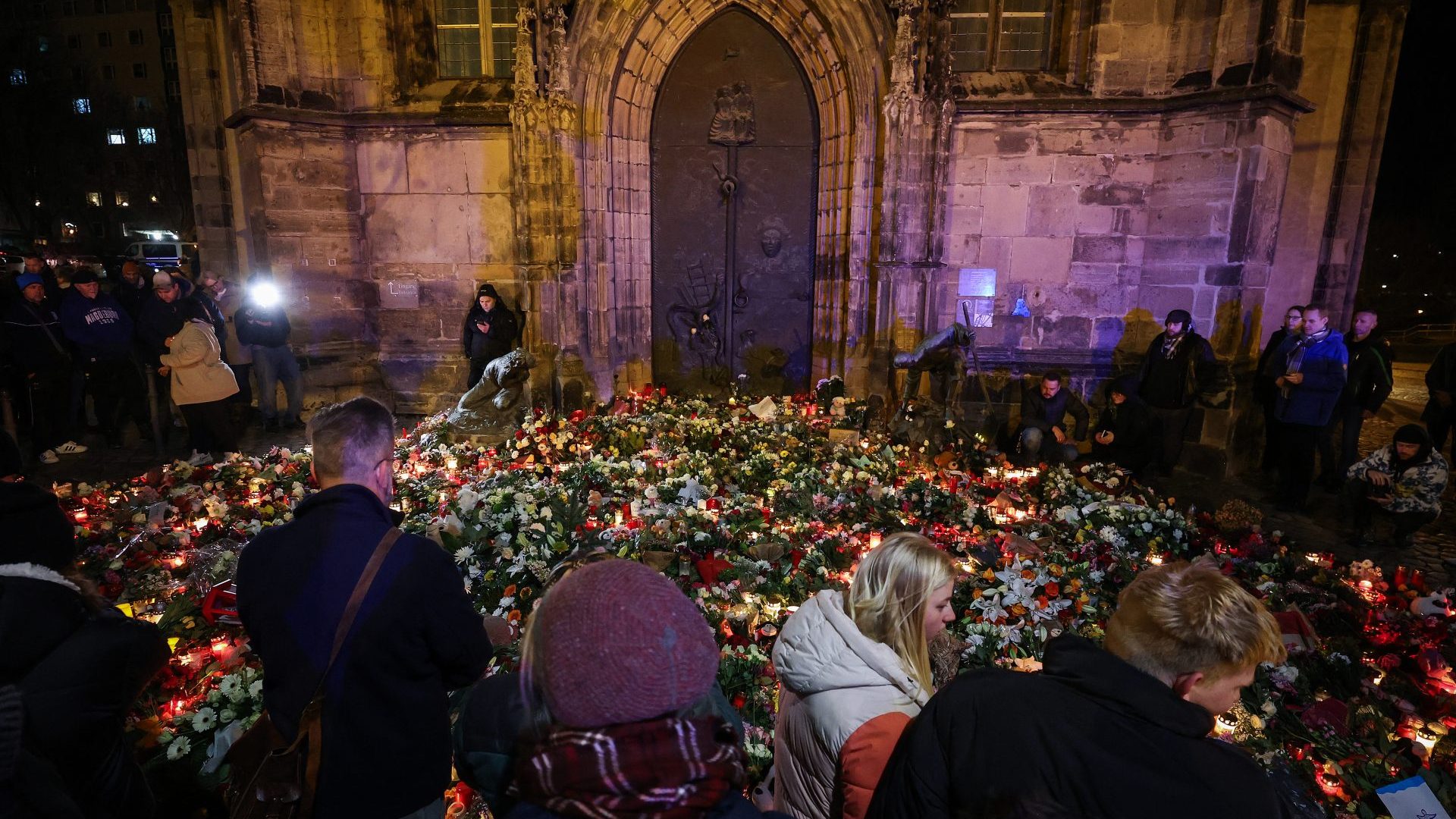“Warum?” That is the simple question handwritten on a white card amid the colourful carpet of tributes, flowers and candles at the scene of the atrocity in Magdeburg. Why?
Five people are dead. They include a nine-year-old child. More than two hundred are injured after a driver at the wheel of a hired SUV deliberately drove into the crowd at a Christmas market.
The crime has provoked grief, shock – and a flood of fake news that has made the simple question “why?“ incredibly complicated. This “why?” has become confused by wild assertions and unfounded assumptions – in the process it has become loaded with political weight.
The Magdeburg atrocity is horrifically reminiscent of a similar attack that took place in Berlin in 2016. Then, the driver was claimed as a so-called “soldier of Islamic State”. He was shot dead by the police who tried to arrest him.
Now, eight years later, we are at the height of a general election campaign in which immigration policy is the hottest topic. People on social media, especially X/Twitter, jumped to conclusions about the identity and motives of the Magdeburg attacker, and almost all of those conclusions were wrong.
What is known, and confirmed by the authorities, is that the suspect, now in custody, is a fifty-year-old psychiatrist, who works with criminals and addicts at a secure institution in a small town near Magdeburg. He allegedly hired a car and drove it into the crowd of shoppers and revellers.
Born into a Shi-ite Muslim family in Saudi Arabia, the suspect had come to Germany in 2006 as a refugee. Claiming asylum on the grounds that he is an atheist and highly critical of both the Saudi royal family and fundamentalist Islam, he was granted indefinite leave to remain in Germany. In his spare time he has worked to help Saudi women to claim refuge in Germany. We know this from an interview he gave to the Frankfurter Allgemeine Zeitung newspaper in 2019.
On his X social media account, verified by fact-checkers at the public service broadcaster MDR, the alleged attacker had expressed support for the anti-islamic, anti-immigration Alternative für Deutschland (AfD) political party. This is why Germany’s interior minister Nancy Faeser described him in a press conference as being “obviously islamophobe”.
Police chief Tom Oliver-Langhans, questioned at a press conference, noted the fact that the alleged perpetrator had been signed off on sick leave as unfit for work since October. He said he was keeping an open mind on what this could suggest about possible motivations for the crime.
That didn’t stop Elon Musk from using his own social media channel to blame the attack on chancellor Olaf Scholz, calling on him to resign and labelling him an “incompetent fool”. Musk also claimed that the AfD is the only party that can “rescue” Germany. The leader of the AfD, Alice Weidel, purred in satisfaction in a tweet responding to Musk, in which she wished him a happy Christmas.
But the AfD’s response to the attack was to put out a wave of inaccurate information. The AfD claimed there were in fact 11 dead, that a bomb had been found in the market, that the car driver was one of five plotters, of whom three are still at large. All of these claims were false. Videos of Syrian refugees in Germany applauding the overthrow of Bashar al Assad on December 8th were uploaded on AfD-supporting social media. The images were presented falsely as Syrians celebrating the deadly attack in Magdeburg.
Wild online conspiracy theorists suggested that the attack was part of a ruse by Israel to boost western support for its war against Hamas, or perhaps an attempt by Kurdish refugees to get publicity for their separatist cause.
Just as Keir Starmer struggled to contain the fake news and racial and religious hatred that erupted after the killings in Southport, Germany’s politicians confront that same challenge. With the exception of the AfD, they are refusing to comment on speculation and urging a thorough enquiry. Chancellor Scholz called it a “terrible, crazy act” and promised that nothing would escape investigation.
On Saturday, national political leaders, grave-faced and dressed in black, gathered for a memorial service in Magdeburg cathedral. Meanwhile AfD supporters, along with extreme-right so-called “Reichsburgers”, were also massing in the city. While Scholz, president Frank-Walter Steinmeier and Saxon-Anhalt’s prime minister Reiner Haselhoff paid tribute to the victims, Bishop Gerhard Feige spoke of the brutal attack which left them all “sad and angry, helpless and scared, insecure and despairing, speechless and uncomprehending.” Hundreds of people stood in the cold and rain outside the cathedral to watch a live screening of the service.
Just a few streets away, right-wing extremists were calling for an end to “Islamisation” and “mass immigration”. There were jeers of “traitor” as politicians assembled for the service. The local human rights organisation SALAM has reported a new upsurge in attacks on people in Magdeburg who “look like foreigners”. In one attack, a single individual was set upon and beaten up by four people.
The AfD urges its followers to ignore TV and radio news and calls print journalism Lügenpresse – “the lying press”. Instead, the party produces its own media and social media, including a channel in Russian, backed by the Kremlin.
Which means that, even when the full explanation emerges about why the Magdeburg tragedy occurred, the AfD’s supporters won’t ever hear it. And so, when Germany’s general election takes place on February 23 next year, a significant part of the electorate will be basing their vote on alternative facts.









